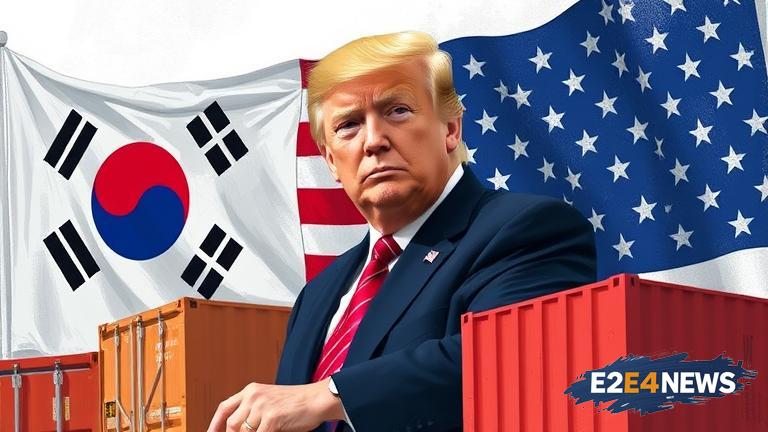In a recent announcement, President Trump stated that the US will impose a 15% tariff on South Korean imports, citing unfair trade practices and a significant trade deficit. This move is expected to have far-reaching consequences for the global economy, particularly for South Korea, which is one of the US’s largest trading partners. The tariff will apply to a wide range of goods, including electronics, automobiles, and textiles. The decision has been met with criticism from South Korean officials, who argue that the tariff will harm their economy and lead to job losses. The US has been seeking to renegotiate its trade agreement with South Korea, known as the Korea-US Free Trade Agreement (KORUS), which was signed in 2012. The US has been pushing for greater access to the South Korean market, particularly in the areas of agriculture and services. However, South Korea has been resistant to these demands, citing concerns about the impact on its domestic industries. The imposition of the tariff is seen as a way for the US to pressure South Korea into making concessions in the trade negotiations. The move is also expected to have implications for other countries, including China, which is the US’s largest trading partner. The US has been engaged in a trade war with China for several years, and the imposition of the tariff on South Korean imports is seen as a way for the US to demonstrate its commitment to protecting its trade interests. The tariff is expected to take effect in the coming months, although the exact timing is still unclear. The move has been met with criticism from business groups and economists, who argue that the tariff will lead to higher prices for consumers and reduced economic growth. The US Chamber of Commerce has stated that the tariff will harm American businesses and workers, and has urged the administration to reconsider its decision. The South Korean government has also announced that it will take retaliatory measures against the US, including imposing its own tariffs on American goods. The move is expected to escalate trade tensions between the two nations, and could have significant implications for the global economy. The US and South Korea have a long-standing trade relationship, with the US being one of South Korea’s largest export markets. However, the relationship has been strained in recent years, particularly over issues related to trade and security. The imposition of the tariff is seen as a way for the US to reassert its influence in the region, and to demonstrate its commitment to protecting its trade interests. The move is also expected to have implications for other countries in the region, including Japan and China, which are also major trading partners of the US. The US has been seeking to strengthen its trade relationships with countries in the region, particularly through the negotiation of new trade agreements. However, the imposition of the tariff on South Korean imports is seen as a setback for these efforts, and could undermine the US’s credibility as a trade partner. The move is also expected to have significant implications for the global economy, particularly in terms of trade and investment. The imposition of the tariff is seen as a way for the US to protect its domestic industries, but it could also lead to higher prices for consumers and reduced economic growth. The move is expected to be closely watched by other countries, particularly in the region, and could have significant implications for the future of global trade.
